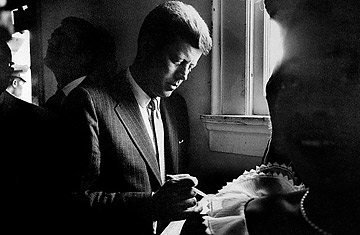
John F. Kennedy's loyal White House aides, Kenneth O'Donnell and Dave Powers, titled their 1972 J.F.K. memoir Johnny, We Hardly Knew Ye—despite the fact that they had served him since his days as a scrawny young congressional candidate in Boston. So it's no surprise that Americans are still trying to figure out nearly half a century after his abbreviated presidency who Jack Kennedy really was. Was he a cold war hawk, as much of the history establishment, Washington pundit class and presidential hopefuls of both parties—eager to lay claim to his mantle of muscular leadership—have insisted over the years? Or was he a man ahead of his time, a peace-minded visionary trying to untie the nuclear knot that held hostage the U.S. and the Soviet Union—and the rest of the world?
As the U.S. once again finds itself in an endless war—this time against terror, or perhaps against fear itself—the question of Kennedy's true legacy seems particularly loaded. What is the best way for America to navigate through a world where its enemies seem everywhere and nowhere at the same time? What can we learn from the way Kennedy was trying to redefine the U.S. role in the world and to invite Americans to be part of that change? Who was the real John Fitzgerald Kennedy?
The conundrum begins with Kennedy himself, a politically complex man whose speeches often brandished arrows as well as olive branches. This seemingly contradictory message was vividly communicated in J.F.K.'s famous Inaugural Address. While Kennedy vowed the nation "would pay any price, bear any burden, meet any hardship, support any friend, oppose any foe to assure the survival and success of liberty"—aggressive rhetoric that would fit right in with George W. Bush's presidency—the young leader also dispensed with the usual Soviet bashing of his time and invited our enemy to join us in a new "quest for peace, before the dark powers of destruction unleashed by science engulf all of humanity." It would be hard to imagine the current occupant of the White House extending the same offer to Islamic jihadists or Iran's leaders.
Young Jack Kennedy developed a deep, visceral disgust for war because of his—and his family's—experiences in it. "All war is stupid," he wrote home from his PT boat in the Pacific battleground of World War II. That war destroyed the family's sense of godlike invincibility. His older brother Joe—a Navy pilot—died in a fiery explosion over the English Channel after volunteering for a high-risk mission, and the young husband of "Kick" Kennedy, J.F.K.'s beloved sister, was also killed. As Jack wrote to Claiborne Pell in 1947, the war had simply "savaged" his family. "It turned my father and brothers and sisters and I upside down and sucked all the oxygen out of our smug and comfortable assumptions... Now, after all that we experienced and lost in the war, we finally understand that there is nothing inevitable about us."